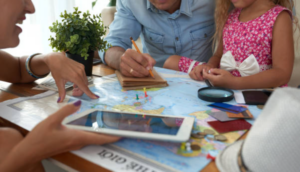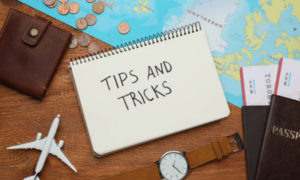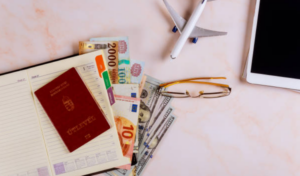How To Plan Budget For Travel Trip
When planning a budget for your travel trip, the first step is to determine your total available funds. Consider your income, savings, and any additional sources of money you can allocate toward your trip. Once you have a clear budget, it’s time to break it down into categories. Consider expenses such as transportation, accommodation, meals, activities, and any unforeseen costs.
Researching the average costs in your destination will help you estimate these expenses more accurately. In addition, understanding options for financial assistance for stranded travelers can add another layer of security to your planning. Setting limits for each category ensures you don’t overspend, contributing to a stress-free travel experience. Stick around for the rest of the article to discover valuable tips on sticking to your travel budget and the countless benefits of creating one.
Steps for Creating a Travel Budget
To create a travel budget, start by estimating the total cost of your trip. This includes transportation, accommodation, meals, activities, and other expenses. Set a budget goal and determine how much money you need to save to reach that goal.

Take into account all the expenses associated with the trip. This includes visa fees, travel insurance, and transportation to and from the airport.
Plan for unexpected expenses by setting aside a contingency fund. Compare prices and shop for the best deals for flights, accommodations, and activities. This will help you make the most of your travel budget.
Estimate the Total Cost of the Trip
Calculate the overall expenses of your travel adventure to paint a vivid picture of the total cost in your mind. Start by listing all the possible expenses you might incur during your trip. This includes transportation costs, such as flights or train tickets, and accommodation expenses, such as hotel bookings or rental fees.
Don’t forget to factor in daily expenses like meals, activities and additional costs like visas or travel insurance. Research the average prices for these items in your destination for a better estimate.
Once you have a comprehensive list, add all the costs to get a rough idea of the total amount you’ll need for your trip. Remember to include a buffer for unexpected expenses or emergencies.
By estimating your trip’s total cost, you’ll better understand how much you need to save and can plan your budget accordingly.
Set a Budget Goal and Determine How Much Money will be Saved to Reach that Goal
Decide on a target amount to save and determine the amount you’ll put aside each month to achieve that goal.
Setting a budget goal ensures you have enough money for your travel trip. Start by determining how much you will spend on the trip and what expenses you must cover, such as accommodation, transportation, food, and activities.
Consider the duration of your trip and the destination to estimate the total cost. If your trip is international and you realize your passport is missing or expired, you might wonder how to obtain a replacement passport. Once you have a target amount, calculate how much you can save each month by analyzing your income and expenses. This may require adjusting your spending habits and cutting back on unnecessary expenses.
By setting a budget goal and determining how much money you’ll save each month, you can stay on track and make your travel dreams a reality.
Determine and account for all the expenses associated with the trip
Consider your adventure’s costs and ensure you account for every expense.
Consider transportation expenses, including flights, trains, or rental cars. Don’t forget to factor in gas or public transportation costs once you arrive.
Next, consider accommodation expenses. Research different options, such as hotels, hostels, or vacation rentals, and compare prices to find the best fit for your budget.
Additionally, think about food and dining expenses. Plan for meals at restaurants, but also consider the cost of groceries if you plan on cooking some of your meals.
Other expenses include activities and attractions, travel insurance, visa fees, and vaccinations.
By accounting for all these expenses, you can create a more accurate budget for your travel trip and avoid any financial surprises along the way.
Plan for Unexpected Expenses
Make sure you’re prepared for any surprise costs that may arise during your adventure. Planning for unexpected expenses is crucial to budgeting for a travel trip.
No matter how meticulously you plan your budget, there may always be unforeseen circumstances that require additional funds. It’s wise to set aside a contingency fund specifically for unexpected expenses. This fund can cover emergencies or unforeseen events such as medical emergencies, lost or stolen belongings, flight delays or cancellations, or any other unexpected costs.
Planning for these unexpected expenses ensures you’re not caught off guard and can enjoy your trip without financial stress.
Compare Prices and Shop Around for The Best Deals
Now that you’ve planned for unexpected expenses, it’s time to dive into the exciting part of budgeting for your travel trip: comparing prices and shopping for the best deals. This step is crucial in ensuring you get the most value for your money.
Start by researching and comparing flights, accommodations, transportation, and activities prices. Don’t settle for the first option; take the time to explore different websites, compare prices, and read reviews.
Look out for discounts, promotions, and package deals that can help you save even more. By diligently searching and taking advantage of the best deals available, you can stretch your travel budget further and have a fantastic trip without breaking the bank.
Tips for Sticking to Your Travel Budget
When it comes to sticking to your travel budget, there are several key points to remember.

First, it’s essential to research and plan so you know what expenses to expect and can allocate your funds accordingly.
A daily spending limit can help you stay on track and avoid overspending.
Lastly, tracking your expenses as you go will allow you to see where your money is going and adjust as needed.
Don’t forget to look for free activities and entertainment and take advantage of discounts and loyalty programs to save even more money during your travels.
Research and plan ahead
Before embarking on your travel adventure, take the time to delve into research and meticulously plan.
Researching your destination thoroughly will better understand the local culture, customs, and costs.
Look for information on the best times to visit, popular attractions, local transportation options, and accommodation options that fit your budget.
By planning, you can take advantage of early booking discounts and find the best deals on flights, accommodations, and activities.
Additionally, having a detailed itinerary and budget will help you stay on track during your trip and avoid overspending.
So, do your homework and plan to ensure a smooth and affordable travel experience.
Set a Daily Spending Limit
To make your travel experience more enjoyable and relatable, it’s essential to set a daily spending limit. This will ensure you don’t overspend and can fully enjoy your destination’s fantastic experiences. By setting a daily spending limit, you are giving yourself a clear boundary and a realistic budget to stick to.
This will help you prioritize your spending and decide where to splurge and save. It’s important to consider all aspects of your trip, including accommodation, transportation, meals, activities, and souvenirs. By setting a daily spending limit, you can avoid the stress of overspending and have peace of mind knowing that you are staying within your budget while still making the most of your travel adventure.
Track Expenses as You Go
Tracking expenses as you go gives you a clear overview of your spending habits and helps you make informed choices about your finances while on your journey. By keeping track of every expense, whether it’s a meal, accommodation, transportation, or entertainment, you can easily see where your money is going and identify any unnecessary or excessive spending.
This way, you can adjust your budget if needed and ensure that you stay within your planned spending limits. Additionally, tracking expenses as you go helps you avoid surprises regarding your overall travel budget. You’ll better understand how much you’ve already spent and how much you have left for the remainder of your trip.
This knowledge allows you to prioritize your spending and make smarter financial decisions, ensuring you have enough money for all the experiences and activities you want to enjoy during your travels. So, make it a habit to record your expenses regularly, whether it’s through a budgeting app or a simple notebook, and stay on top of your travel finances.
Look for Free Activities and Entertainment
Explore the local area to discover hidden gems, free activities, and entertainment options to excite your journey.
Stroll through the neighborhood and watch for local festivals, street performances, or parks where you can relax and enjoy the surroundings.
Visit local museums or art galleries that offer free admission on certain days or explore the vibrant street markets where you can soak up the atmosphere without spending a dime.
Additionally, take advantage of the natural beauty by hiking or walking in nearby parks or beaches.
Not only will you save money, but you’ll also have the opportunity to immerse yourself in the local culture and create unforgettable memories without breaking the bank.
Take Advantage of Discounts and Loyalty Programs
By utilizing discounts and loyalty programs, you can score exclusive deals and rewards that enhance your overall travel experience while saving money.
Many hotels, airlines, and car rental companies offer discounts and loyalty programs for frequent travelers. By signing up for these programs, you can enjoy benefits such as discounted rates, free upgrades, and priority boarding.
Some credit card companies also offer travel rewards programs where you can earn points for every dollar spent, which can be redeemed for flights, hotel stays, or even cash back.
Research and compare different programs to find the best value for your travel needs.
Taking advantage of these discounts and loyalty programs can significantly reduce your travel expenses, allowing you to allocate more of your budget toward other aspects of your trip.
Benefits of Creating a Travel Budget
When it comes to creating a travel budget, there are several benefits that you can enjoy.

First, it allows you to save on overall costs by carefully planning and allocating your expenses.
Second, having a budget helps reduce stress and worry, as you know exactly how much you can spend and where.
Lastly, a travel budget makes it easier to manage your money while on the road, ensuring that you stay within your limits and avoid overspending.
Savings on Overall Costs
You can save money by opting for budget-friendly accommodations and eating at local restaurants instead of expensive tourist spots to cut expenses. Look for affordable hostels or guesthouses that offer clean and comfortable rooms at a fraction of the cost of luxury hotels.
You can also consider renting an apartment or using homestay options, which provide a unique cultural experience and help you save money on accommodation.
When dining, explore local eateries and street food stalls where you can savor authentic cuisine at affordable prices. Avoid eating at touristy restaurants that charge higher prices for the same dishes.
By making these simple choices, you can significantly reduce your overall travel expenses and have more money to spend on other experiences or save for future trips.
Less Stress and Worry
Experience a sense of calm and peace as you release stress and worry during your journey.
By planning your travel budget effectively, you can alleviate the financial burden and focus on enjoying your trip.
Knowing that you have set aside enough money for transportation, accommodation, meals, and activities will give you the confidence to immerse yourself in the experience fully.
No more fretting about overspending or constantly checking your bank account.
With a well-planned budget, you can relax and embrace the adventure without any nagging concerns.
Letting go of financial stress will allow you to fully appreciate the sights, sounds, and cultures you encounter.
So take the time to plan your budget and enjoy a worry-free travel experience.
Easier to Manage Money While Traveling
A well-managed travel fund allows you to effortlessly navigate your expenses and make the most of your journey. When you plan your budget for a travel trip, you can allocate specific amounts to different categories like accommodation, transportation, food, and activities. This way, you clearly understand how much money you have available for each aspect of your trip and can make informed decisions on where to spend or save.
By keeping track of your expenses and sticking to your budget, you’ll avoid overspending and better grasp your finances while traveling. Using travel guiding assistance apps can further enhance this process. It also gives you peace of mind knowing you have enough money for emergencies or unexpected situations.
With a well-managed travel fund, you can enjoy your trip without worrying about money, fully immersing yourself in the experience.
Conclusion
In conclusion, planning a budget for your travel trip is crucial for a successful and stress-free journey. Following the steps outlined in this article, you can create a comprehensive budget covering all aspects of your trip, from transportation and accommodation to food and activities.
Remember to be realistic and flexible when setting your budget, as unexpected expenses may arise. Additionally, sticking to your budget can help you stay on track financially and avoid overspending. By being mindful of your spending and making wise choices, you can make the most of your travel experience while maintaining financial stability.



